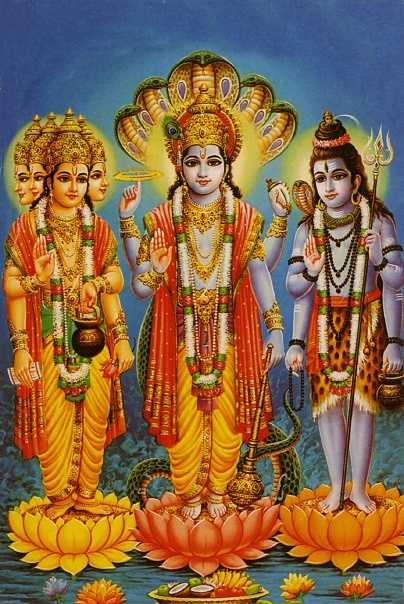Hinduism is basically an ancient
religion known as “Brahmanism”. It is best defined as a complexity of all
religious ideas of India. The original polytheistic religious philosophy of the
Brahman was founded about 2500 B.C. and Hinduism surfaced in the latter portion
of the B. C. era.
The Brahman is considered to be the Supreme Being that is the origin and support of the phenomenal solar system. He is also referred to as the Absolute or Godhead of everything in the entire Universe. The sages of the Upanishads teach that Brahman is the ultimate Creator that cannot be seen or heard, but whose nature can be known through the development of self-knowledge. The Brahman is an infinite being and is mankind's consciousness.
The Hindu believes in the
transmigration of souls and their final union with the Absolute Spirit. It is
believed that the Brahma (one of the Hindu gods) is the original existence of
all individual souls. The Brahman can be divided into creating, preserving and
destroying principles, as personified in the Hindu gods: Brahmā, Shiva and
Vishu.
Brahmā is the god of Creation and one of the Trimūrti (Hindu Trinity). He is the father of Manu, and from Manu all human beings are descended. He is not to be confused with the Great Spirit known as Brahman, which is genderless.
Shiva is the Destroyer or Transformer of the Trimurti. He is a yogi that takes notice of everything that happens in the world and is the main aspect of life. In the Smarta tradition, he is regarded as one of the five primary forms of God.
Vishnu is the Preserver of the Trimurti. He is also venerated as one of the five primary forms of God. He is noted for being the master of [and beyond] the past, present and future. He also supports, sustains and governs the Universe and originates, as well as developes, all the elements within.
 |
| Brahma, Vishnu, Shiva |
While Hinduism has no organized
common creed, there are two sacred Hindu texts which are divided into two books known as Śruti ("revealed") and Smriti ("remembered"). These commentaries discuss theology, philosophy, mythology, rituals and temple building [among other topics]. Major scriptures include the Vedas, Upanishads, Purāṇas, Mahābhārata, Rāmāyaṇa, Bhagavad Gītā and Āgamas.
In the 19th century A.D.,
Christianity began to affect Hinduism and many religious sects were founded
which reflected this. The most well-known sect
which emerged was the Rama-Krishna movement of the late 1800’s. Gadadhar Chattopadhyay was a mystic in the latter part of the 1800's who founded a religious school of thought which led to the formation of the Ramakrishna Mission.
Between the
most primitive and the most advanced versions, Hinduism has survived for
thousands of years and is still a stronghold of a religion. Hinduism has about one billion followers worldwide and is the third largest religion, after Christianity and Islam. Today, the majority
of Hindu adherents can be found in India, Nepal, Bangladesh, Indonesia, Sri
Lanka and Pakistan.
1 comment:
I'm not sure why but this website is loading very slow for me.
Is anyone else having this issue or is it a problem on my end?
I'll check back later on and see if the problem still exists.
My weblog - basement renovation ideas ()
Post a Comment